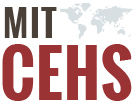The technique could enable restoration efforts and doesn’t require labor-intensive onsite sampling. (Harvey lab)
Using fluorescent labels that switch on and off, MIT engineers can study how molecules in a cell interact to control the cell’s behavior. (Boyden lab)
Desirée Plata is on a lifelong mission to make sustainability a bigger factor in design decisions. (Plata lab)
While useful for killing pathogens including SARS-CoV-2, the lights may cause unwanted chemical reactions and should be used with ventilation, researchers say. (Kroll lab)
Study finds climate policy alone cannot meaningfully reduce racial/economic disparities in air pollution exposure. (Selin lab)
Brad Pentelute and his lab compel the anthrax delivery system to deliver antibody and peptide variants into cells to treat cancer. (Pentelute lab)
MIT engineers developed a new way to create these arrays, by scaffolding quantum rods onto patterned DNA. (Bathe lab)
SMART researchers find the enzyne RlmN, which directly senses chemical and environmental stresses, can be targeted in drug development. (Dedon lab)
MIT researchers find timing and dosage of DNA-damaging drugs are key to whether a cancer cell dies or enters senescence. (Yaffe lab)
SMART researchers combine rifaximin and clarithromycin to effectively restore the latter drug's efficacy. (Dedon lab)
Keystone Science Lecturer Bevin Engelward, Sc.D., described models and screening tests she developed to explain how exposures affect DNA stability. (Engelward lab)
The new diagnostic, which is based on analysis of urine samples, could also be designed to reveal whether a tumor has metastasized. (Bhatia lab)
New modeling tool enables rapid design of effective and equitable policy combinations. (Selin lab)
The biological engineer is recognized for his scientific achievements over the course of his career. (Dedon lab)
SOT Education Award
This award recognizes an individual who is distinguished by the teaching and training of toxicologists and who has made significant contributions to education in the broad field of toxicology.
- Bevin Page Engelward, ScD, Massachusetts Institute of Technology
This MIT researcher gained recognition for her work on tracing how the toxin NDMA damages genes, and how the DNA might repair itself. (Essigmann lab)
Biologists have mapped out more than 300 protein kinases and their targets, which they hope could yield new leads for cancer drugs. (Yaffe lab)
Using these engineered proteins, researchers can record histories that reveal when certain genes are activated or how cells respond to a drug. (Boyden lab)

